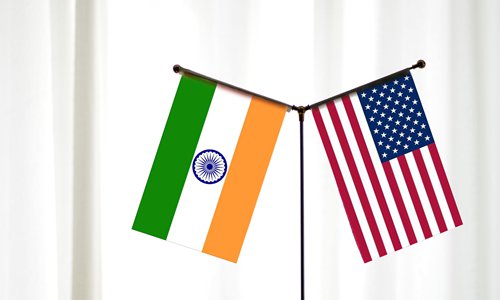Unlike Australia, India treads softly on ties with US
Source:Global Times Published: 2019/9/19 0:34:02

Photo: IC
Editor's Note:
US President Donald Trump will travel to Texas on Sunday to attend an event with Indian Prime Minister Narendra Modi culminating in their third meeting. Later the same day, Trump will join a tour in Ohio with Australian Prime Minister Scott Morrison. Why does the US attach importance to advancing relations with India and Australia? Is it indicative of efforts by the superpower to reinforce its Indo-Pacific strategy? Global Times reporter Lu Yuanzhi talked to two Chinese experts.
Ni Feng, deputy director of the Chinese Academy of Social Sciences' Institute of American Studies
Trump may talk with leaders of India and Australia on intensifying the Indo-Pacific strategy and boosting bilateral ties with the two countries. Trump may discuss current tensions in South Asia with Modi, as India's revocation of the special status to India-controlled Kashmir has led to strong repercussions in the international community and strained India-Pakistan ties. Additionally, trade and investment could also be discussed at the bilateral meetings.
Amid the US-launched trade war against China, Washington needs support and wants the backing of other countries, especially its allies and partners, in order to mount its leverage against China. In the backdrop of the China-US rivalry, Washington hopes New Delhi and Canberra can side with it, while the two Indo-Pacific countries have their own considerations. They may support the US in some aspects, but won't side with the US without reservation. However, as a traditional ally, Canberra may lean more toward Washington.
The Trump administration began using the "Indo-Pacific" label in November 2017 and regards the notion as its regional strategy by close cooperation among Japan, India, Australia and the US. Washington's paying attention to the ties with two of the core countries shows its intention to cement the Indo-Pacific strategy, which will pile more pressure on China and thwart the development of the 21st Century Maritime Silk Road.
China should strengthen relations with countries in its periphery so as to hedge against attempts at containment by the US.
Zhang Jiadong, professor at the Center for American Studies, Fudan University
The US has long been wooing India to contain China because of India's strategic value. With China's rise, both the US and India have felt threatened by China, leading the two countries to get closer. But because of Trump, pace of improving Washington-New Delhi ties has slowed down. India seems not to trust Trump and believes he does not keep his word. Trump is reluctant to assume the alliance obligations and even blackmail the US allies for the sake of American interests.
Washington does want to consolidate its Indo-Pacific strategy, but is encountering difficulties. As a US ally, Australia lacks diplomatic independence and tends to rely on the US. In this context, Canberra has proactively responded to Washington's Indo-Pacific strategy. However, India is different. On one hand, New Delhi wants to utilize Washington's Indo-Pacific strategy to restrain China; on the other, this South Asian country hopes to maintain its status as an independent power. Therefore, India will not throw itself into US arms like Australia did.
Furthermore, Canberra is concerned with India's pursuit of hegemony in the Indian Ocean region. The divergence between India and Australia may add the difficulties for the US to consolidate its Indo-Pacific strategy.
Australia has been a close ally of the US and there is not much room for further development. But there seems a lot to do with India, which is following a balanced strategy and having frequent interactions with great powers such as China, Russia and the US. To reinforce its Indo-Pacific strategy, Washington will make efforts to achieve more solid ties with India.
RELATED ARTICLES:
Posted in: CHINA-INDIA